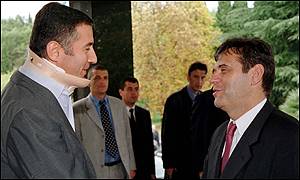
Montenegro had introduced the mark as a parallel currency alongside the dinar in June.
Yugoslavia doesn't exist
|
|
Montenegrin President Milo Djukanovic
|
He told the Associated Press last week that, as far as he was concerned, Yugoslavia no longer existed.
"Present-day Yugoslavia must be changed to the union of two internationally recoginsed states," he said.
Referendum
On Friday, Mr Djukanovic said his government would hold a referendum on greater independence unless the union between Serbia and Montenegro were radically modified.
He suggested that Montenegro and Serbia could each hold their own referendum, but said his republic would hold one whether or not Serbia did.
Recent polls suggest that 55% of Montenegrins favour independence.
Montenegro and Serbia are the last partners in the Federal Republic of Yugoslavia, after Croatia, Slovenia, Macedonia and Bosnia-Herzegovina broke away.
'No rush'
Mr Djukanovic told Serbian TV: "Our proposal is for an alliance between Montenegro and Serbia covering three key functions: a common army, a common foreign policy and a common currency."
However there was no rush, the Montenegrin president said, to find a suitable framework for redefining ties between the two countries.
"It is in Serbia's and Montenegro's interest to find quality solutions which are acceptable both to our citizens and to the international community," he said.

Mr Djukanovic says Montenegro will vote whether Serbia does or not
|
"Even if we were two independent states, I think it would be a great error to erect barriers between us," he said.
Although he welcomed Yugoslavia's re-entry into the United Nations, Mr Djukanovic signalled that he would seek international recognition of Montenegro's sovereignty.
"My view is that our states could have two seats at the United Nations if the people of Serbia and Montenegro opt for this solution," he said.
New era
Relations between the two partners came under strain earlier this year when then Yugoslav President Slobodan Milosevic pushed through constitutional changes that diminished Montenegro's standing in the federation.
But Vojislav Kostunica, who defeated Mr Milosevic in 24 September presidential elections, has insisted that things have now changed.
He said that, with the new situation in Serbia, "the conditions will be met for the democratic authorities" in the two republics to "make a democratic decision over the future destiny of their peoples".
| Search BBC News Online |
||
Advanced search options |
||
The BBC is not responsible for the content of external internet sites



